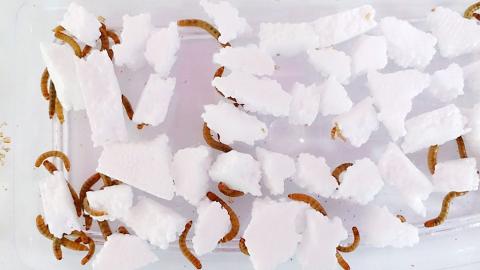After three years of research, a team from Kaohsiung’s I-Shou University has isolated the bacteria in the guts of mealworms and superworms that enable them to dissolve polystyrene.
Researchers have known for years that the Tenebrio molitor, or mealworm, and Zophobas morio, or superworm, can digest polystyrene, with all studies indicating that the effect was enzymatic in origin and related to bacteria in the worms’ digestive tracts, said Liu Hsiao-han (劉孝漢), a professor at the university’s Department of Biological Science and Technology who led the study with three students.
However, research has been largely stymied by their slow-acting effect, even when enzymes directly extracted from the digestive tracts of mealworms were applied to polystyrene, Liu said.

Photo courtesy of Kuo Ting-an
Liu said he became acquainted with the biodegradation process through his research work with now-retired professor Yang Mei-kwei (楊美桂) of Fu Jen Catholic University, adding that their group was also stumped at the slow decomposition process.
However, under Yang’s suggestion, the I-Shou research team introduced a special enzyme, which accelerated the pace of degradation from half a year to one day, Liu said.
The team was able to identify two bacteria strains from the worms’ guts, calling them TM1 and ZM1.
The results allowed the group to conduct quantitative analysis and increase the viability of similar experiments, Liu said, adding that the research team has applied for patents in Taiwan and the US.
If the team is able to identify the genetic makeup of the key enzyme in future experiments, it may be possible to clone the genetic material onto other germs, such as the easily cultivated Escherichia coli bacteria, Liu said.
It could pave the way for making polystyrene biodegradable at an acceptable pace, Liu said.
Kuo Ting-an (郭庭安), one of the students involved in the project, said he had initially wanted to pursue research in cosmetics, but decided against it after discovering that the majority of his classmates wanted to do the same and decided to follow his instructor in conducting research on mealworms.

Taiwan is to commence mass production of the Tien Kung (天弓, “Sky Bow”) III, IV and V missiles by the second quarter of this year if the legislature approves the government’s NT$1.25 trillion (US$39.78 billion) special defense budget, an official said yesterday. Commenting on condition of anonymity, a defense official with knowledge of the matter said that the advanced systems are expected to provide crucial capabilities against ballistic and cruise missiles for the proposed “T-Dome,” an advanced, multi-layered air defense network. The Tien Kung III is an air defense missile with a maximum interception altitude of 35km. The Tien Kung IV and V

The disruption of 941 flights in and out of Taiwan due to China’s large-scale military exercises was no accident, but rather the result of a “quasi-blockade” used to simulate creating the air and sea routes needed for an amphibious landing, a military expert said. The disruptions occurred on Tuesday and lasted about 10 hours as China conducted live-fire drills in the Taiwan Strait. The Civil Aviation Administration (CAA) said the exercises affected 857 international flights and 84 domestic flights, affecting more than 100,000 travelers. Su Tzu-yun (蘇紫雲), a research fellow at the government-sponsored Institute for National Defense and Security Research, said the air

Taiwan lacks effective and cost-efficient armaments to intercept rockets, making the planned “T-Dome” interception system necessary, two experts said on Tuesday. The concerns were raised after China’s military fired two waves of rockets during live-fire drills around Taiwan on Tuesday, part of two-day exercises code-named “Justice Mission 2025.” The first wave involved 17 rockets launched at 9am from Pingtan in China’s Fujian Province, according to Lieutenant General Hsieh Jih-sheng (謝日升) of the Office of the Deputy Chief of the General Staff for Intelligence at the Ministry of National Defense. Those rockets landed 70 nautical miles (129.6km) northeast of Keelung without flying over Taiwan,

A strong continental cold air mass is to bring pollutants to Taiwan from tomorrow, the Ministry of Environment said today, as it issued an “orange” air quality alert for most of the country. All of Taiwan except for Hualien and Taitung counties is to be under an “orange” air quality alert tomorrow, indicating air quality that is unhealthy for sensitive groups. In China, areas from Shandong to Shanghai have been enveloped in haze since Saturday, the ministry said in a news release. Yesterday, hourly concentrations of PM2.5 in these areas ranged from 65 to 160 micrograms per cubic meter (mg/m³), and pollutants were